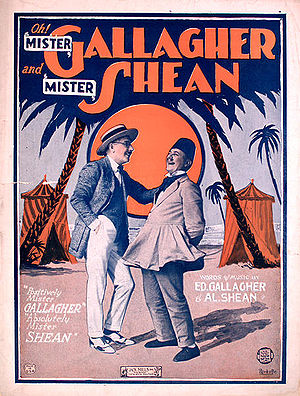- Mister Gallagher and Mister Shean
-
"Mister Gallagher and Mister Shean" is one of the most famous songs to come from vaudeville. First performed by the duo of Gallagher and Shean in the early 1920s, it became a huge hit and carried Gallagher & Shean to stardom.
It contains jokes typical of the time but also lampoons current fads and events ("Cost of living went so high / That it's cheaper now to die"). The song itself gave rise to many parody versions.
As this song was sung on the vaudeville stage, each verse was presented as a miniature skit, as though Shean came across Gallagher on a street, beginning: "Oh, Mister Gallagher! Oh Mister Gallagher! Have you heard...?" Gallagher would say "Yes, yes" to his entreaties before the joke was set up in the verse.
Though it had absolutely nothing to do with the song (aside from one reference to the Nile made in one of the original verses that was occasionally used), the two performed the song in Egyptian costume (Gallagher in white suit and pith helmet of the tourist, Shean in fez and bizarre skirted jacket of the "native" colonial), to tap into the craze for all things Egyptian after the discovery of King Tut's tomb.
The refrain at the end of the each verse -- "Positively Mister Gallagher, absolutely Mister Shean!" -- became a well-known catchphrase for many years thereafter. A version was performed on television by Groucho Marx (Shean's nephew) with Jackie Gleason in the late 1950s, and Lenny Bruce made off-handed reference to it in his 1960s nightclub act, all of them confident that it would be immediately recognizable to the audience. In the 1974 play Travesties, by Tom Stoppard, the characters Gwendolen and Cecily sing a parody version of the song, substituting their own names. As late as the late 1980s the song was the centerpiece of an advertising campaign by the Pitney-Bowes corporation ("Absolutely Mister Pitney, positively Mister Bowes!").
There are several versions of the song, and a long list of verses, as it was occasionally reworked or updated, as was typical of topical vaudeville songs. It was recorded both on a popular 78 rpm disc record and on an early "talkie" film, both of which featured the original performers. The song also is heard in the soundtrack of the feature films Ziegfeld Girl (1941), in which Shean himself appears, and Atlantic City (1944).
This song inspired at least the jingle associated with the household cleaning product Mr. Sheen; whether it directly inspired the product name is unknown.
References
External links
Categories:- Vaudeville songs
- Year of song unknown
- 1920s songs
Wikimedia Foundation. 2010.

